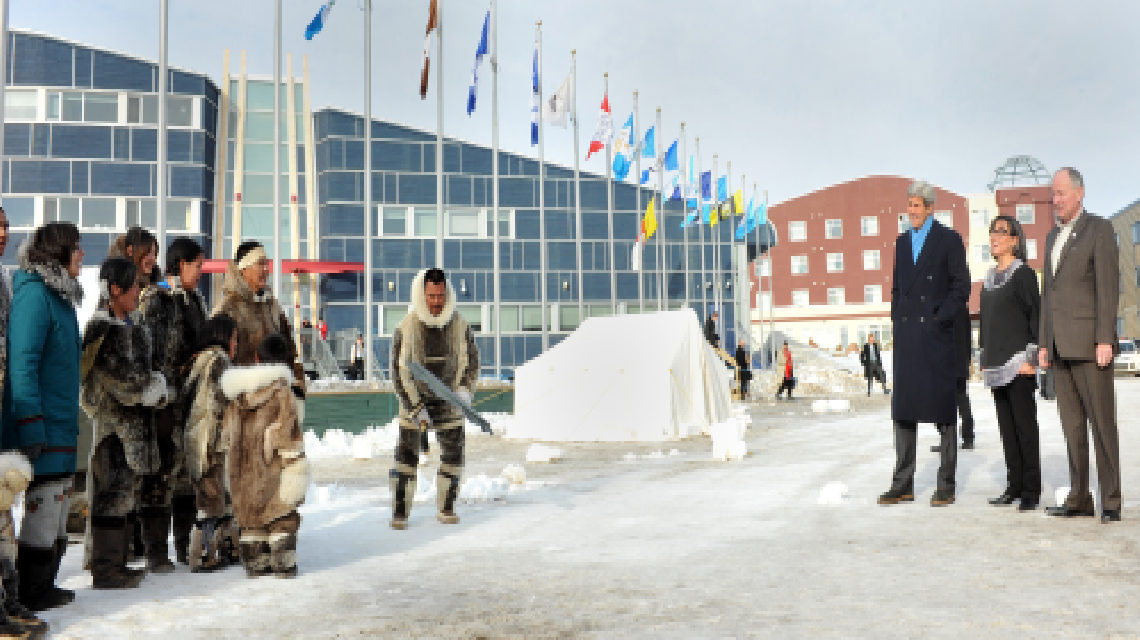Ministers from eight Arctic states and leaders of Arctic Indigenous Peoples met 24 April 2015 in Iqaluit, Nunavut, Canada, marking the conclusion of Canada’s Arctic Council Chairmanship and the beginning of the United States’ Chairmanship.
At the meeting, Ministers signed the Iqaluit Declaration 2015, which highlights the accomplishments of the Arctic Council during Canada’s Chairmanship (2013-2015) and guides the work of the Council under the Chairmanship of the United States (2015-2017).
U.S. Secretary of State John F. Kerry, the new Chair of the Arctic Council, stated, “There’s only ‘one Arctic’ and all of us – the United States, other nations, indigenous peoples, and Arctic communities - must join together to ensure responsible stewardship of this incredible region.”
The theme of the U.S. Chairmanship is “One Arctic: Shared Opportunities, Challenges and Responsibilities”. During the U.S. Chairmanship, the Arctic Council program will focus on addressing the impacts of climate change; supporting Arctic Ocean safety, security and stewardship; and improving economic and living conditions in Arctic communities. The Council also established two new task forces: the Task Force on Arctic Marine Cooperation and the Task Force on Telecommunications Infrastructure in the Arctic.
Priority deliverables during Canada’s Chairmanship that were approved by Ministers in Iqaluit include:
- A Framework Plan for Cooperation on Prevention of Oil Pollution from Petroleum and Maritime Activities in the Marine Areas of the Arctic;
- A collection of work related to short-lived climate pollutants, including the Framework for Action on Enhanced Black Carbon and Methane Emissions Reductions, that will lead to local health, economic and climate benefits; a report recommending actions to reduce black carbon emissions from residential wood combustion in the Arctic; and two assessments on black carbon and tropospheric ozone and methane;
- To improve mental wellness in Arctic communities, a report, entitled Sharing Hope, that identifies best practices and promising interventions;
- Keeping Our Traditions Alive: Compendium of Best Practices in Promoting the Traditional Ways of Life of Arctic Indigenous Peoples, a collection of examples from across the region showcasing how traditional ways of life can continue to support healthy Arctic communities today and into the future;
- Recommendations on how to better use traditional and local knowledge in the work of the Council to improve decision making and research;
- A Guide to Oil Spill Response in Snow and Ice Conditions in the Arctic;
- The Arctic Adaptation Exchange, an interactive website containing information that will help Arctic residents, researchers and decision-makers adapt to the effects of climate change;
- Arctic Pollution Issues 2015: Summary for Policy-makers, which presents the conclusions and recommendations of three assessments on human health, trends in persistent organic pollutants and radioactivity in the Arctic;
- Arctic Marine Tourism Project Best Practice Guidelines that promote the benefits that tourism can bring to the region while addressing risks associated with increased activity
- Arctic Marine Strategic Plan (2015-2025), which aims to provide a framework to protect Arctic marine and coastal ecosystems and to promote sustainable development in the region;
- Arctic biodiversity work, including an action plan to implement the 17 recommendations from the landmark Arctic Biodiversity Assessment; and a detailed work plan to protect migratory birds along key international flight paths; and
- Creation of the Arctic Economic Council (AEC), an independent forum of business representatives.
For more information, visit www.arctic-council.org.





